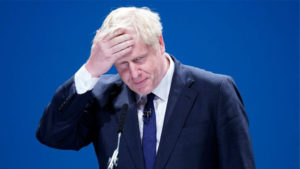 British Prime Minister Boris Johnson finally succumbed to political reality Thursday and agreed to resign after the latest ethics scandal around his leadership led some 50 senior lawmakers to quit the government.
British Prime Minister Boris Johnson finally succumbed to political reality Thursday and agreed to resign after the latest ethics scandal around his leadership led some 50 senior lawmakers to quit the government.
Johnson had clung to power for two days, defiantly telling lawmakers on Wednesday that he had a “colossal mandate” from voters and intended to get on with the business of government.
But he was forced to concede defeat Thursday morning after two more members of his Cabinet quit and one of his closest allies, Treasury Chief Nadhim Zahawi, publicly told him to resign for the good of the country.
It wasn’t immediately clear when Johnson would leave office, however.
His resignation will trigger an internal election to pick a new leader of the Conservative Party, who will also be the next prime minister. That process is likely to take place over the summer.
Johnson signaled that he intends to stay in office until that concludes. Such a move would be controversial, and critics say he should not be allowed to remain even as caretaker prime minister.
“Now PM has finally done the decent thing he needs to hand in the seals of office, apologise to Her Majesty (Queen Elizabeth II), allow her to appoint a Caretaker under whom Ministers can serve, so the Conservative Party can choose a new leader properly,” George Freeman, who quit as science minister on Thursday, said in a tweet.
Zahawi, who was promoted earlier this week as Johnson tried to shore up his Cabinet, said he and a group of colleagues had privately expressed their concerns to the prime minister on Wednesday and he decided to go public after Johnson ignored the advice to resign.
“I am heartbroken that he hasn’t listened and that he is now undermining the incredible achievements of this government,” Zahawi said in a letter posted on Twitter. “But the country deserves a government that is not only stable, but which acts with integrity.”
Thursday morning’s resignations meant that 50 Cabinet secretaries, ministers and lower-level officials had quit the government over two days, often castigating the prime minister for his lack of integrity. With more than 20 positions unfilled, the crisis had stalled the business of some parliamentary committees because there were no ministers available to speak on the government’s behalf.
